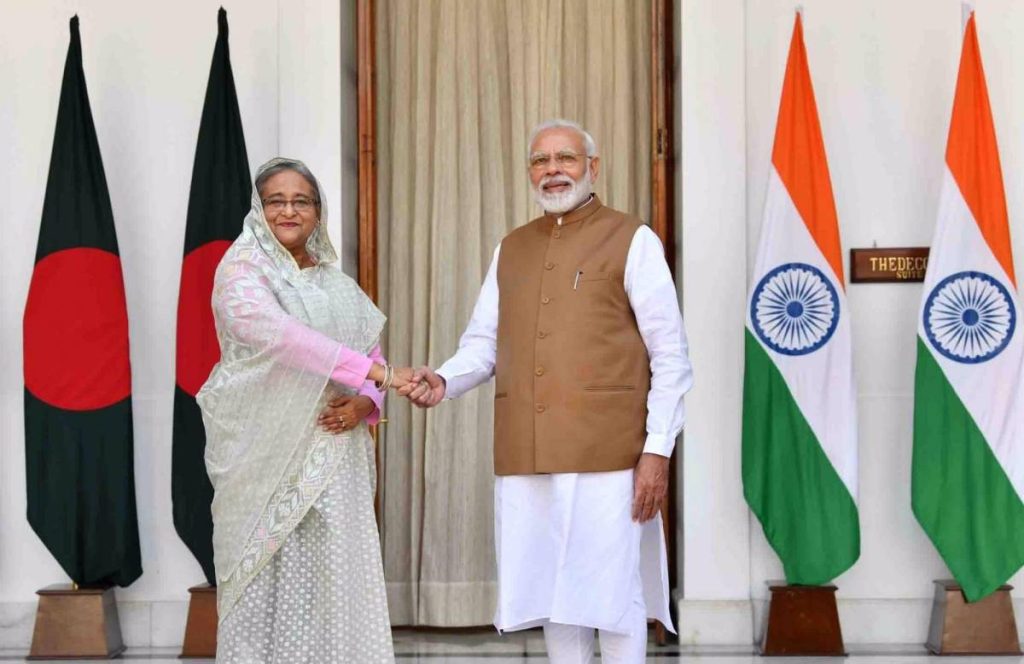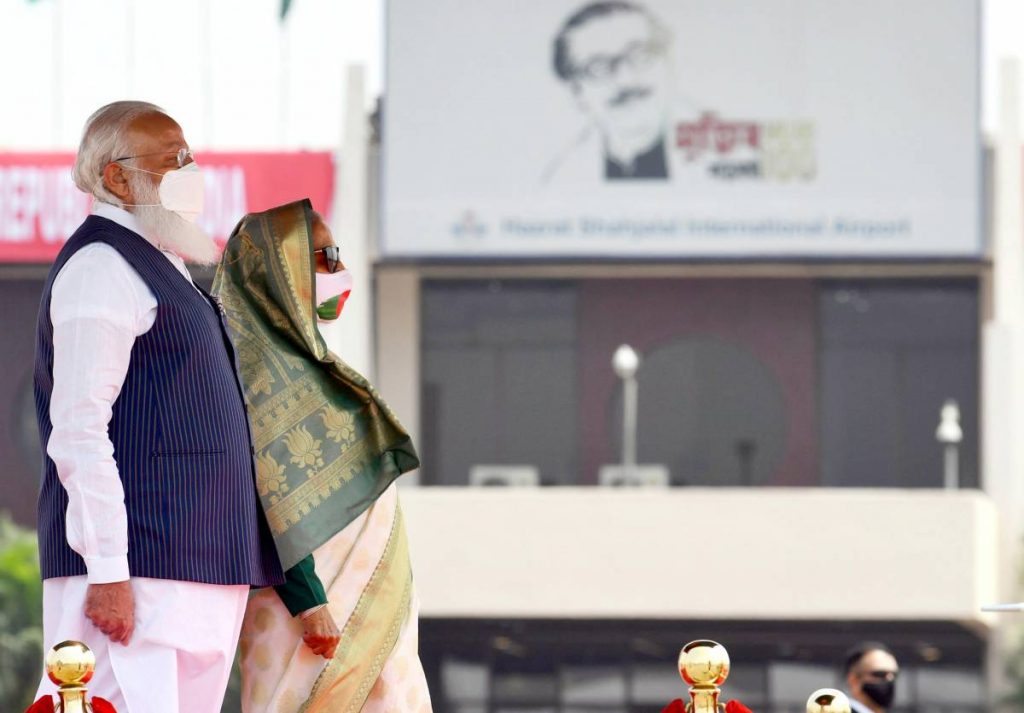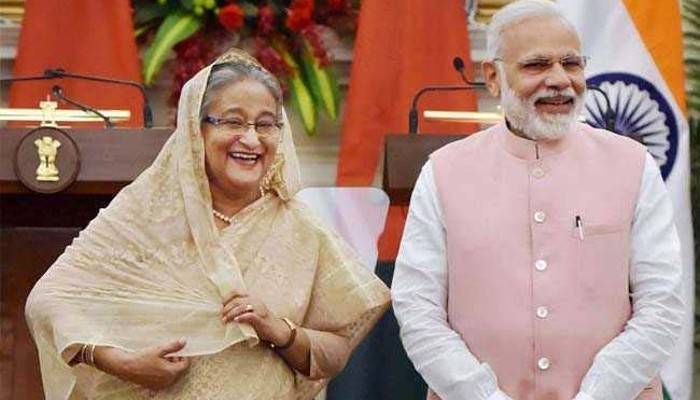A 131.5 km long India-Bangladesh Friendship Pipeline (IBFP) will help Bangladesh to overcome its energy crisis and propel its growth and development. Indian view is shaped by trust, goodwill and mutual benefit along with respect to the sovereignty and territorial integrity of Bangladesh … writes Abdul Rahman
A 131.5 km long India-Bangladesh Friendship Pipeline (IBFP) has been jointly inaugurated by Indian Prime Minister Narendra Modi and his Bangladeshi counterpart Sheikh Hasina that will connect Siliguri in West Bengal to Parbatipur in Dinajpur district of Bangladesh. Built at a cost of Rs.377 crore, the pipeline will carry one million tonnes of High-Speed Diesel from the Numaligarh refinery of Assam to the Parbatipur depot of Bangladesh Petroleum Corporation.
This new pipeline is another milestone in already growing and strengthening India[1]Bangladesh ties. Bangladesh is facing an acute energy crisis, especially burdened by an ongoing Russia-Ukraine war. The prices of oil and gas have spiked manifold, compelling Bangladesh to cease the purchase of gas and shut down some of the diesel-run power plants.
In such a distressed situation, India has stood up to Bangladesh’s expectations and needs by providing it with the requisite help. Through IBFP, Bangladesh will be able to significantly reduce its fuel transportation cost as it used to import diesel through railway carriages which was not only costly and time-consuming but also cumbersome as it involved unloading, storage and distribution processes.

The IBFP is one among several measures undertaken by India to ease Bangladesh’s energy crisis. India is also carrying out projects like Maitree Super Thermal Power Plant. India has offered concessional finance to Bangladesh to build the 1320 MW Maitree project. This project is being developed at a cost of USD 2 billion and the first unit of this power plant at Rampal in Bangladesh’s Khulna province has already begun to supply 660 MW of electricity to the energy-embattled nation.
India and Bangladesh have also entered into a joint venture viz. Bangladesh India Power Company Limited between India’s National Thermal Power Corporation (NTPC) and Bangladesh Power Development Board. Additionally, a regular supply of power to Bangladesh is being provided from Godda Thermal Power Plant in Jharkhand.
The IBFP is not the first transnational petroleum pipeline in the region that India has commissioned. The Motihari – Amlekhgunj pipeline with Nepal was the first such pipeline. This is a 69-kilometre pipeline connecting Parsa in Nepal to Motihari in India’s Bihar. Built with an investment of over Rs.324 crore, this pipeline has become the lifeline for Nepal to meet its energy requirements. Appreciating the importance of such a pipeline and the help and support given by India, Nepal is seeking India’s assistance to construct two more petroleum pipelines connecting the Indian refinery and Nepal’s depot. Under a Government-to-Government (G2G) agreement, Nepal has asked for technical expertise and grant assistance to give effect to two more pipelines like that of the Motihari – Amlekhgunj petroleum pipeline.
This successful example is what Bangladesh too wants to carry out that will help the nation tide over the energy deficit it faces. Noting India’s support in Bangladesh’s effort to mitigate the energy crisis, Bangladesh’s Power Minister Nazrul Hamid is seeking more energy imports from India as well as playing a leading role in facilitating meeting Bangladesh’s energy needs from elsewhere.

In this regard, India has been enabling Bangladesh to access clean and cheap energy from Nepal and Bhutan. In fact, India has proposed a power trade network on a multilateral framework of BBIN (Bangladesh, Bhutan, India, Nepal) that will help the entire sub[1]region of the Indian subcontinent. India has also committed to providing Bangladesh with power generated from the hydropower projects that are coming up in the Indian states of Sikkim and Arunachal Pradesh.
The IBFP and other such collaborative measures may also be seen as a strategy of Bangladesh to offset its increasing dependence on China. The Chinese investment has already run to the sum of USD 8.31 billion in Bangladesh’s energy sector. Bangladesh is well aware of China’s debt trap playbook. It is wary of the acute financial crisis in Sri Lanka and the major reasons behind it and does not want that to repeat in Bangladesh.
To put out the facts straight, Sri Lanka owes more than USD 8 billion debt to China which includes loans from the Chinese Development Bank. If the private debt is included in this figure, the total debt will skyrocket even further.
Moreover, these debts were given at unsustainably high-interest rates. China’s infrastructure investments aim at creating economic dependencies, which are then exploited for strategic purposes. Hambantota port of Sri Lanka is a case in point. The port was intended to transform a small fishing town into a major shipping hub. In pursuit of that dream, Sri Lanka relied on Chinese financing. But Sri Lanka could not repay those loans, and in 2017, it had to give China a controlling equity stake in the port and a 99-year lease for operating it.
Against this backdrop, IBFP and other cooperative measures between India and Bangladesh become very important. India’s overtures are driven by the notion of co-prosperity for the region and the principle of ‘Neighbourhood First.’
Bangladesh to overcome its energy crisis and propel its growth and development. Indian view is shaped by trust, goodwill and mutual benefit along with respect to the sovereignty and territorial integrity of Bangladesh. This is in stark contrast, for example, to China’s policy of salami slicing and debt trap diplomacy. Bangladesh is well aware of this fact and therefore wants to build closer and stronger bilateral ties with India in multiple areas including energy security.

Leave a Reply